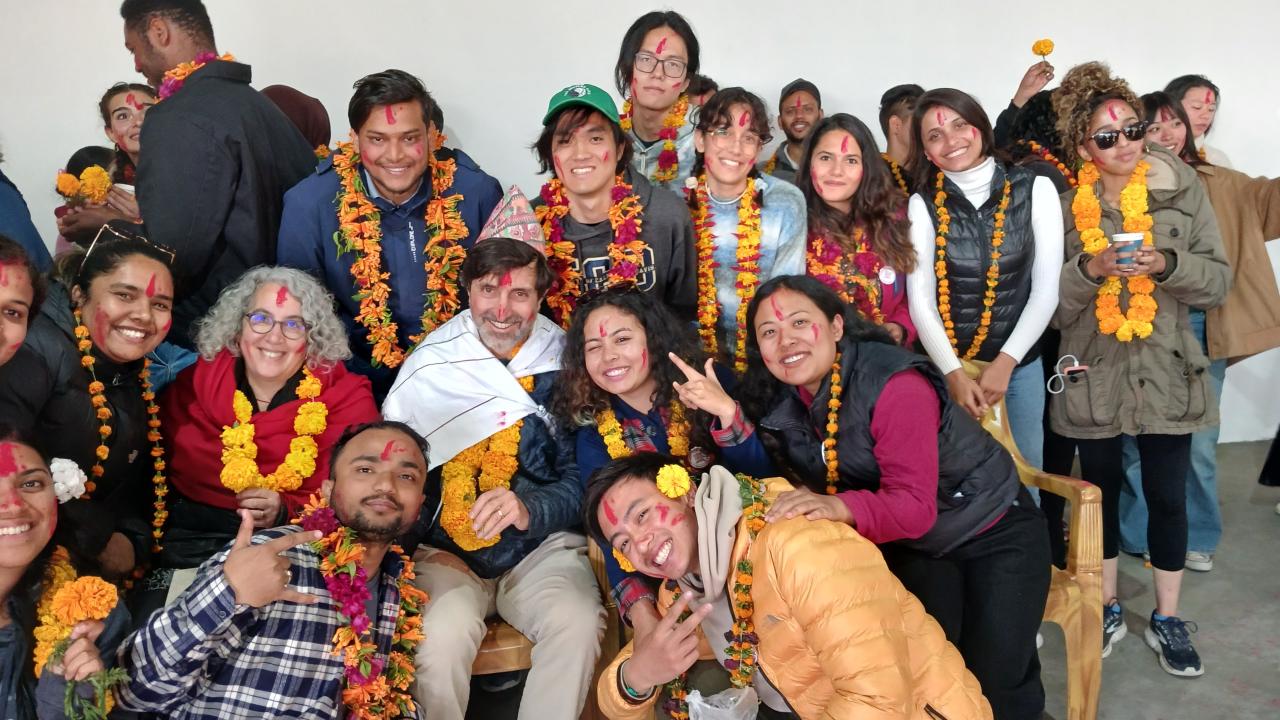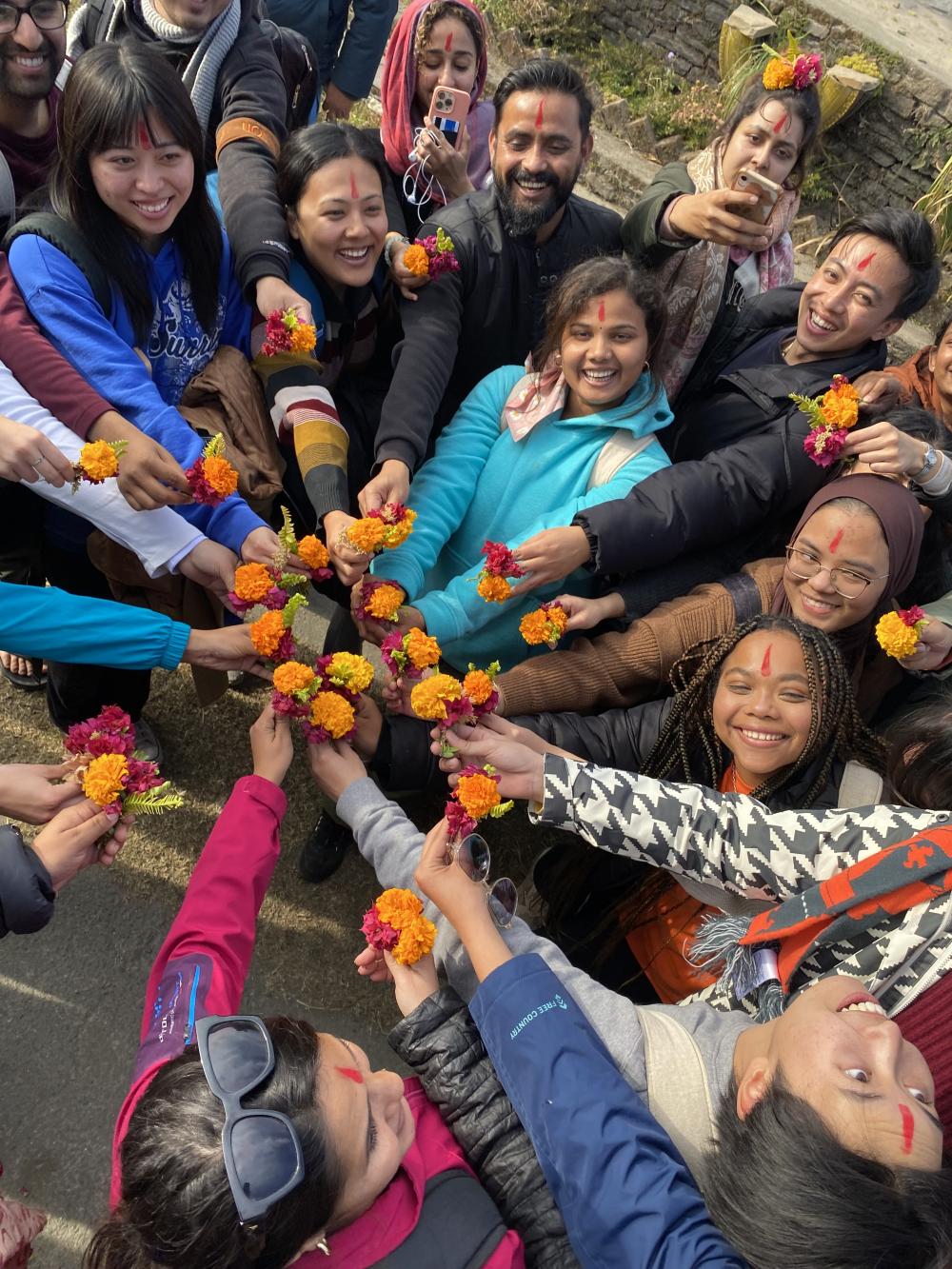
Studying in Nepal: Students Find Adventure, Friendship and Purpose
UC Davis professors with a longstanding connection to Nepal, along with their Nepalese colleagues, lead a learning exchange program that offers students a profound immersion in the country’s vibrant culture, environment and history. Through hands-on projects designed with a small rural village, students gain a unique perspective on global citizenship and community engagement while creating special bonds with new friends.
Jonathan London, professor of community and regional development with the Department of Human Ecology, and Nancy Erbstein, associate vice provost of global education for Global Affairs and faculty member with the School of Education, co-developed and co-instruct “Nepal Study Abroad Program: Community, Technology and Sustainability.” London and Erbstein have been traveling to Nepal since their own college days, and over the years have maintained friendly relationships with many people from Machhapuchhre Village, a picturesque, culturally complex community surrounded by majestic mountain peaks.

During the most recent program offering, 19 students from UC Davis and 17 Nepali students spent the fall and winter quarters working together on three projects: creating a website for an indigenous mothers group, building a business expansion and marketing plan for a milk cooperative run by a local Dalit community, and designing a visitor’s center to share information for tourists interested in a new culturally oriented trekking route. The students from both countries spent 10 weeks working on their plans virtually before coming together for a three-week visit to Nepal over winter break.
Erbstein said the program is designed to encourage global learning and action while supporting a diversity of students’ personal and professional development.
“We’ve really seen students have transformative experiences on this program,” Erbstein said. “They develop the capacity to do international, intercultural, interdisciplinary, community-engaged work.”
Nepali students are connected to the UC Davis program through a partnership with the Hands-On Institute. London, who recently earned the 2023-24 Excellence in Teaching for Global Learning Award for his continued work with the program, said they recruit students from across campus to bring together individuals from a wide array of academic and cultural backgrounds.
“The students can apply and see in real life, all the concepts that they’re learning about related to issues of social equity, sustainability, community development and agricultural sustainability,” London said. “Based on the majors and minors that they have, all of them have something that they can relate to back in the classroom.”
Remarkable experiences
Sudikshya Bhandari is a native of Nepal and currently a Ph.D. candidate with the Geography Graduate Group on campus. She participated in the study abroad program in 2017 while she was a student in her home country. For the past two programs, she joined the course again as a program assistant, working alongside London and Erbstein to advise students. Her experience with the program – both as a student and assistant – is helping shape her future as she aspires to work on sustainable housing projects and community development.
“This program is very well designed to bring community, research and action together,” Bhandari said. “It’s a great experience for students to go to Nepal, a country that is so diverse, you get a very different perspective on life and community. I got to witness how this program brings together students with diverse backgrounds to promote interdisciplinary and cross cultural collaboration and learning; it's very powerful.”

Christy “Mei” Vong, a junior who is double majoring in community and regional development and Asian American studies, participated in the study abroad program this year and appreciated how easy it was to communicate and work with her peers. She hopes the connections she made will remain tight long after the program.
“I got to know what they were studying, their hopes and dreams,” Vong said. “I hope to stay connected as we grow up together.”
She stayed in Nepal for an additional week after program ended to have a slow goodbye and space to reflect on her experiences before returning to Davis. She was grateful for that extra time spent with some of the Nepali students, who generously hosted Vong in their homes and showed her their cherished spots around Kathmandu and other nearby places, including Pashupatinath Temple.
“I really valued the way they took care of me, and I got to see a glimpse at their lives and appreciate the cultural practices I saw,” Vong said.
Positive impact
Vong was a member of a team that designed a visitor’s center and materials to support local efforts to encourage trekking and hiking tourists to spend some of their time learning about the village and its people. Vong and other students created informational cards and designed prototypes of the center to highlight the culture, history, food and surrounding fauna and flora.
Vong said the day her team presented their final product to the community was a humbling experience and something she’ll never forget.
“After we gave our presentation, we got a chance to dance together, and it was really nice because it felt like what mattered the most during that day was the human part of it,” Vong said. “We all appreciated being able to dance and share joy together. It was heartwarming.”
Another group of students worked on crafting a website for the women’s group, Guranse Bhume Aama Samuha. The website includes student-produced videos featuring members of the group who shared stories about the important contributions they’ve made to their village over several decades. When the website was ready to go live, one of the group’s revered elders ceremoniously launched it online.
“These women are really amazing and powerful,” London said. “They are responsible for a lot of the community development in the village, but they don’t often get adequate credit. This project really helped those women tell their own stories of how important they were and are to the development of the community.”
Both London and Erbstein, along with the other co-instructors Bijay Poudel and Samrat Katwal from the Hands-On Institute, take pride in witnessing the significant personal growth of their students and the positive, sustainable impact they make on the communities they visit in Nepal.
“Students take this experience and go on to do amazing things, from getting jobs, grants and fellowships, to sustaining meaningful relationships,” Erbstein said. “It's a special privilege to get to teach this program.”
Media Resources
- Jonathan London, Department of Human Ecology, jklondon@ucdavis.edu
- Nancy Erbstein, UC Davis Global Affairs, nerbstein@ucdavis.edu
- Tiffany Dobbyn, College of Agricultural and Environmental Sciences, tadobbyn@ucdavis.edu